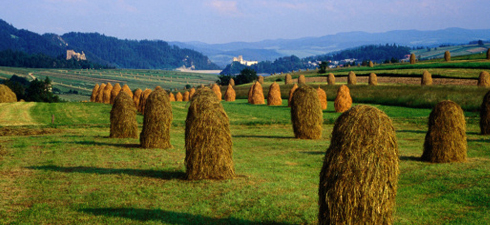"I cry every day." Anna Pakos, a young mother, says it with a laugh. Eight hours a day, five days a week, she peels onions on the farm in the small village of Zabice. The shed where she works is filled with crates of onions. "But the tears don’t last long," she adds reassuringly. In another room dozens of sacks, each the size of a man, wait for Anna. They don’t scare her. She’s happy, she says: “We’re paid two euros per crate, and I peel fifteen small boxes a day." The work earns her much more than the minimum wage in Poland, which is about 350 euros a month. Anna works with 40 other peelers, mostly women, for the Dutch farmer Derreck Bac. At 28, Derreck Bac was one of hundreds of Dutch farmers who settled in Poland in recent years and started up successful businesses. His cousin, Arnold Bac (30), who arrived in the 1990s, is also prospering. But the outlook is far less rosy than it once was.
Poland’s national agency for agricultural land is, in effect, bringing in a policy of deterrence, especially for farmers from abroad. The agency owns most of the land and the leases, and foreigners are not allowed to buy (even if this rule can be easily circumvented, for example by marrying a Polish national). But right now, when tenancy leases come up for renewal they are no longer being extended for fifteen years, as before, but for just a year or two.
The agency is seizing the opportunity to take back some of the leased land, which they divide among small Polish farmers to enable them to better cope with the competition. "It's very annoying," says Arnold. “Your business plan is down the drain, but on the other hand, I understand it. Here in the village the big enterprises buy up everything they can get their hands on. The Poles haven’t got a chance." The agency, he explains, has always had the right to requisition 20 percent of leased lands. But starting last year, the agency has begun to apply this systematically.
This consolidation has its roots in politics: Poland’s parliament is currently considering a bill designed to set a limit on the size of agricultural enterprises. Above this limit the lands would be reclaimed and made available to farmers whose fields are smaller. Eventually this should encourage the creation of a greater number of medium-sized farms (according to the Polish criteria) of between 10 to 50 hectares. While the law has not yet been approved by parliament (and is far from it), the agency is already acting in its spirit.
The law is above all intended to stabilise the agricultural sector. Poland has about 2.4 million farmers, most of whom farm only one or two hectares. The system is extremely unprofitable, and, according to experts, only 400,000 of all farms are viable. However, the sector represents about four percent of GDP and 20 percent of employment. Reforms are needed – and that is why Poland receives hefty EU subsidies.
For his part, Arnold has lost 200 hectares of the 1,600 he used to farm. Anticipating the agency, he offered to give up the least productive fields. Other foreign farmers, who have only the best land, are facing more difficulties in practice. Of the hundreds of Dutch farmers who came to Poland in the last twenty years, most have gone back to the Netherlands. The simple reason is that, even though the land in Poland costs next to nothing, practicing intensive agriculture on the Dutch model would be prohibitively expensive. In the Netherlands, farmers who practice this type of agriculture often work no more than a few hectares, while in Poland the farms sometimes reach 30,000 to 40,000 hectares. On such large tracts of land, considerable amounts of chemical fertilisers and pesticides would be needed – enough to make the cost of intensive agriculture prohibitive.
Another problem for foreign farmers is that the agency is a weather vane at the mercy of political breezes. The current proposal before parliament is backed by the Peasant Party, a minority partner in the ruling coalition in Warsaw. The leader of the coalition, the Civic Platform of Prime Minister Donald Tusk, however, supports the big operators. After elections scheduled for this October, the balance of power between the two parties could change.
Was this article useful? If so we are delighted!
It is freely available because we believe that the right to free and independent information is essential for democracy. But this right is not guaranteed forever, and independence comes at a cost. We need your support in order to continue publishing independent, multilingual news for all Europeans.
Discover our subscription offers and their exclusive benefits and become a member of our community now!












